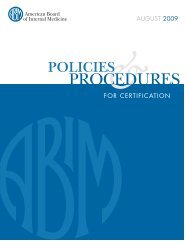The SRA Symposium - College of Medicine
The SRA Symposium - College of Medicine
The SRA Symposium - College of Medicine
You also want an ePaper? Increase the reach of your titles
YUMPU automatically turns print PDFs into web optimized ePapers that Google loves.
Papers<br />
<strong>The</strong> narrative approach, on the other hand, “seeks to contextualize and particularize the conflicts”<br />
and “seeks to recognize the narrative coherence, however obscured, <strong>of</strong> the patient’s life” (Charon,<br />
1994, p. 261). In this approach, the IRB member faces narrative tasks in identifying the multiple<br />
tellers <strong>of</strong> the story – the sponsor, the protocol writers, the researchers, the administrative and legal<br />
editors, and the multiple readers – the IRB, the potential participant, and the public. Additionally,<br />
in that vein, they must address the contradictions among the story’s multiple plotlines, conflicts<br />
among tellers and listeners, and the ambiguities <strong>of</strong> the projected events. All characters in the story<br />
are now active, producing a different rendering <strong>of</strong> respect for persons, beneficence and justice.<br />
<strong>The</strong> standard language contained in the informed consent document assures the participant<br />
that withdrawal from a study is possible at any time without consequences. Within a principlist<br />
framework, such language adequately meets the criteria <strong>of</strong> autonomy. <strong>The</strong> active character <strong>of</strong>fers<br />
the passive character an opportunity to act, a choice to withdraw. Within a narrativist framework,<br />
contextualizing the interaction and rendering all characters active, the participant’s world beyond<br />
the protocol is recognized. Once the experimental agent is injected or consumed, the categories<br />
<strong>of</strong> the participant’s body dysfunction and disintegration defined, the inflections and gestures <strong>of</strong><br />
prognosis insinuated, the effects are irretrievable. <strong>The</strong>y are now a permanent part <strong>of</strong> the lived experience<br />
<strong>of</strong> the participant, complete with its unknown consequences and complications, positive<br />
and negative, to the personal identity and body <strong>of</strong> the participant. Within a principlist framework,<br />
which is decontextualized, recognizing only the actions <strong>of</strong> the researcher in an atemporal setting,<br />
autonomy is real and satisfied using the standard language <strong>of</strong> withdrawal. Within a narrativist<br />
framework, which is contextual, recognizing the actions <strong>of</strong> the researcher and the participant and<br />
temporally situated, autonomy is an illusion and unsatisfied. It becomes clear that the participant<br />
has enrolled in the Hotel California clinical trial. She can check out from the clinical trial anytime<br />
she likes, but she can never leave.<br />
Participants, plotted as the passive characters, may not choose what study drugs they want to<br />
experiment with or when. <strong>The</strong>y may not choose what diagnostics should be used on their bodies.<br />
<strong>The</strong>y may not choose when they meet with the study physician or learn the progress, or lack<br />
there<strong>of</strong>, <strong>of</strong> the study drugs. Participants may not choose which “adverse events” are adverse, the<br />
meaning <strong>of</strong> symptoms, remission or cure. <strong>The</strong>y are discouraged from discussing their experience<br />
with other participants in the same trial. Because <strong>of</strong> the rules <strong>of</strong> study disclosure, they may never<br />
know whether their participation in the study was meaningful or contributed to the greater good<br />
<strong>of</strong> society. If there is no opportunity for choice - the expression <strong>of</strong> value and preference, no opportunity<br />
for communication – the negotiation or clarification <strong>of</strong> needs, desires and motivations,<br />
on what information does beneficence, “in the best interest <strong>of</strong> the participant,” by the researcher or<br />
IRB reviewer rest?<br />
In the absence <strong>of</strong> contextual information, whose values do IRB members use to evaluate the<br />
ethical principles? Do IRB members share uniform definitions <strong>of</strong> autonomy, physical or mental<br />
integrity, and respect for privacy, risk, benefit or what it means to be adequately informed with<br />
the participants they are entrusted to protect? Do IRB members conceptualize participants as<br />
homogenous or diverse in their interests and motivations? Are the principles uniformly applied<br />
by all IRB members to all participants regardless <strong>of</strong> trial or disease process and more importantly,<br />
should they be? How might consideration <strong>of</strong> their own contextual assumptions safeguard respect<br />
for persons, beneficence, and justice?<br />
30 2005 <strong>Symposium</strong> Proceedings Book

















